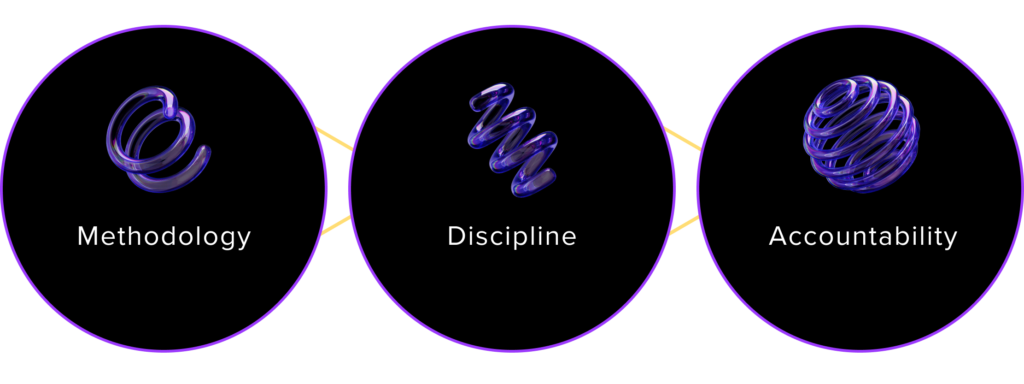Lately, sales have gotten… complicated. New tools, ever more granular metrics, AI-driven everything — with all the innovation, it can be easy to lose sight of the basics.
Don’t get me wrong, there’s no denying that sales have gotten so much more powerful thanks to technologies like big data and AI. But if you’ve been in sales long enough, you know that the core practices that are critical to success have stayed more or less unchanged. These practices are equally essential for startups looking to land those first few deals and established companies needing to meet their growth targets.
Staying grounded in the basics can make all the difference, so let’s do a quick overview of what those basics are.
Back to the Basics: The 3 Pillars of Sales Success
Whether you’re just starting out or have been in the business for years, sales success rests on three key pillars:
- Methodology. Sales teams that follow a clear methodology and coaching attain quota 73% of the time. Every successful sales team needs a clear methodology. Know who your clients are and understand the value you bring them. This will help you uncover their needs and guide you in the right direction.
- Discipline. Consistency is key. Stay in touch with your prospects, build relationships, and be patient. Timing is everything, and opportunities will surface when you’re disciplined in your follow-up.
- Accountability. Own your results – good or bad, it’s on you. Ask for feedback, take responsibility, and use it as an opportunity to improve. Accountability drives growth, and without it, no process will stick.

For New Companies: Start Simple
Startups often feel like they’re flying by the seat of their pants: “We just need to get a few deals, right?” And yes, that’s true—but even from day one, having a simple sales process in place can enable faster results and a clear strategy.
It doesn’t have to be perfect or even complicated—just don’t slack out on the basics. Whether you realize it or not, you already have a process that is either working for you or against you – even if it’s only in your head. If your approach is too disorganized or needlessly complex, you’re missing out on potential growth, even in those early stages.
For Established Companies: Complexity Can Be a Distraction
Now, for those of you already in the game: you’ve been there, done that, seen it all. You’ve got the tools, the training, the AI, and every shiny new thing the industry has to offer. But despite all that, sales are flatlining.
Here’s the truth—sometimes all that innovation can make things more complicated than they need to be. Your team might be caught up in processes that feel overly layered, missing simple things like following up, analyzing the funnel, right CTAs… No amount of tech can make up for a process that lacks clarity at its foundation.
Nothing is set in stone
All in all, sales aren’t static. The needs of your clients will evolve, their timing will shift, and new tools will keep rolling in. But if you focus on the fundamentals—methodology, discipline, and accountability—you’ll always be in a position to adapt. The latest innovations may help you grow, but – shocker – they won’t replace the basics 🙂
Share this article on
Recent posts

Why great sales begin with the right people
What’s the first thing most companies look for when hiring for sales? That undeniable charm. The type of person who could sell ice to a penguin.

Sales Is About Charisma, Not Results?
What’s the first thing most companies look for when hiring for sales? That undeniable charm. The type of person who could sell ice to a penguin.

When’s the right time to start your sales org?
Ah, the classic chicken-and-egg dilemma: what comes first, product delivery or sales?


